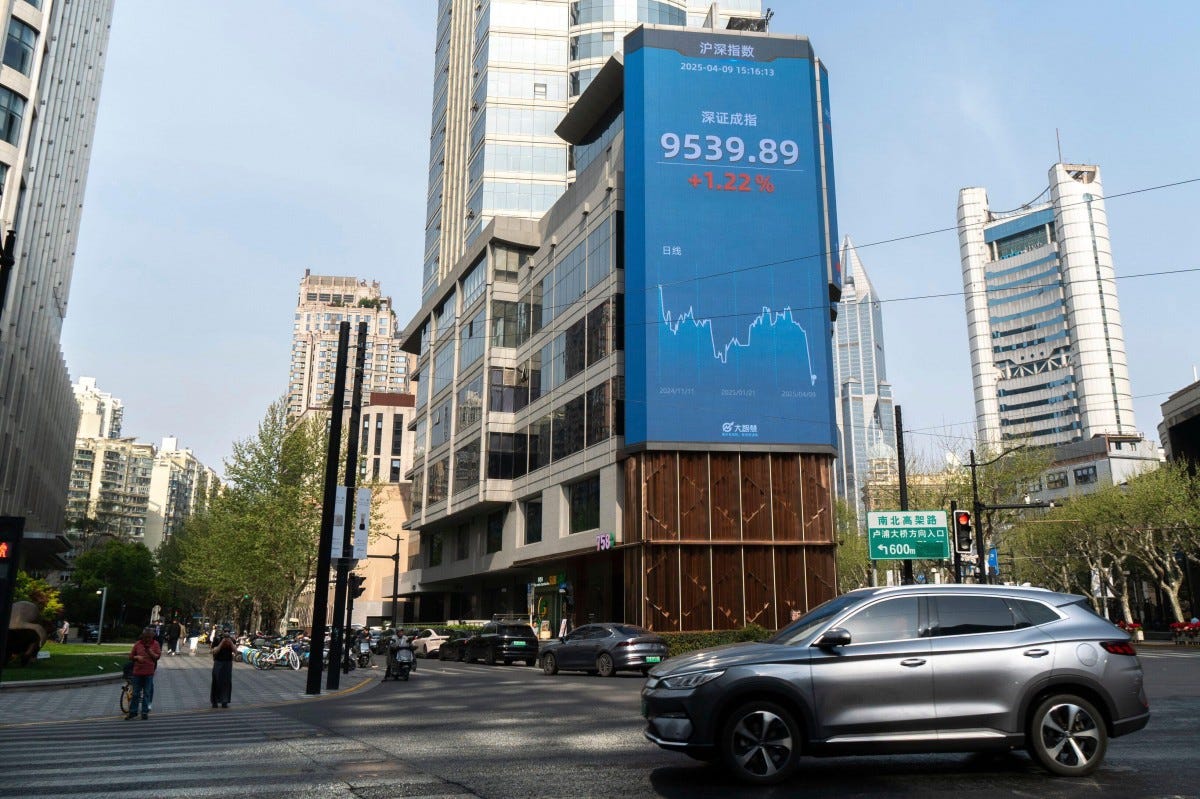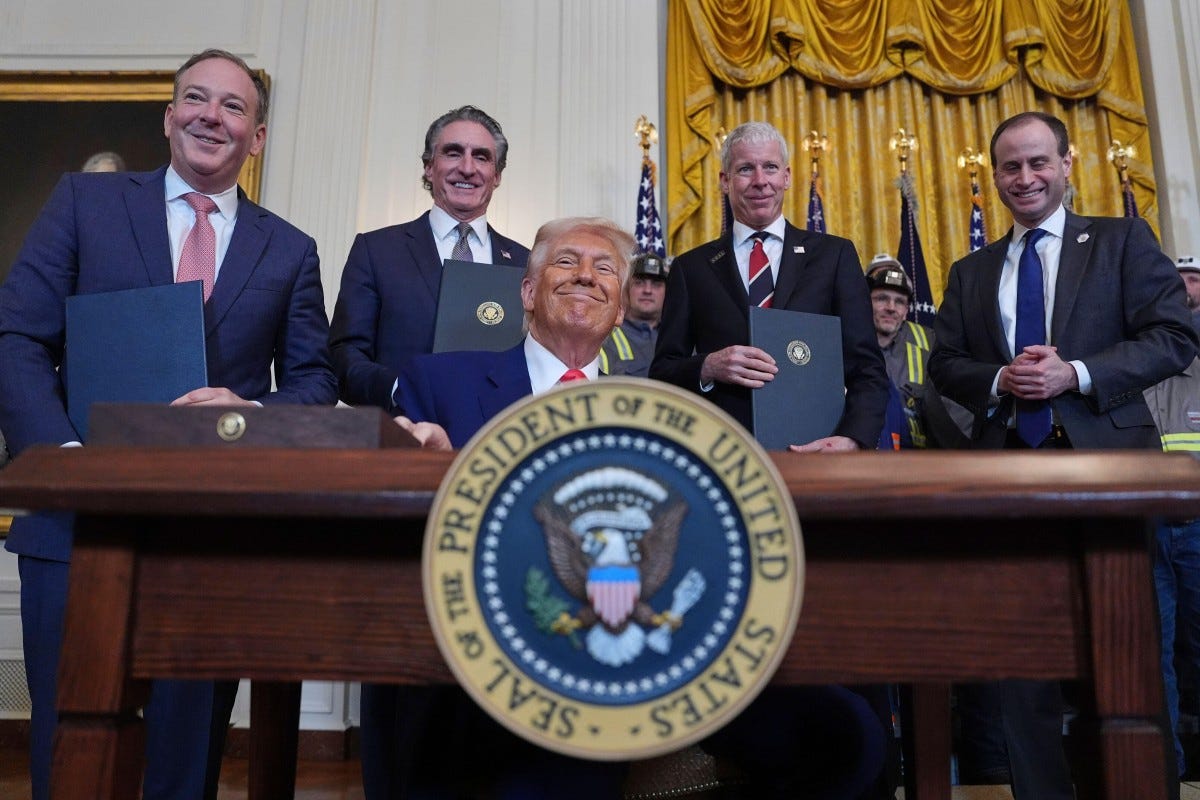
Global markets have rallied this evening, after Donald Trump dramatically U-turned on his tariff policy, albeit with one big exception.
Trump has doubled down on his trade war with China, hiking levies on the world’s second largest economy to a staggering 125%, but for the dozens of countries previously set to be hit with high import charges who haven’t retaliated, “I have authorised a 90 day PAUSE,” he confirmed.
Both policies will be “effective immediately”.
White House Press Secretary Karoline Leavitt has clarified that this pause means a “universal 10%” tariff – the pre-existing rate for Britain – will be put in place for all countries, other than China.
This evening, Trump celebrated his chaotic tariff announcements of late as a successful tactic that has brought 75 countries to the table to negotiate a trade solution. A follow-up from his gloat last night: “These countries are calling us up, kissing my ass”.
As for Beijing, it is being punished “based on the lack of respect [it] has shown to the World’s Markets”, he insisted.
Earlier today, Beijing announced it would raise levies on all US imports from 34 to 84 per cent, in response to Trump’s announcement yesterday that it was hiking up tariffs on Chinese goods to 104%.
Washington will “reap what it sows”, warned China earlier as its finance ministry also confirmed that another six American firms would be added to its “unreliable entities” list, banning them from doing any business with Beijing.
US markets have soared following this evening’s announcement of the 90-day pause, with the Nasdaq index hitting 9% and the S&P 500 reaching 8%.
Canada and Mexico’s stock markets have rallied too in light of news that the flat rate of 10% tariffs will now apply to them both.
The EU, which earlier today approved a first set of retaliatory tariffs against Washington, is not quite out of the woods yet. Treasury Secretary Scott Bessent confirmed that Canada and Mexico – which previously faced rates of up to 25% on some goods – are also included in the 10% baseline tariffs, but he didn’t clarify whether this applies to the EU. While Leavitt’s comment suggests that a 10% tariff will apply to everyone bar Beijing, the fact that China is being punished on account of its retaliation leaves Brussels in uncertain territory.
What will China do now?
“At some point, hopefully in the near future, China will realise that the days of ripping off the USA, and other Countries, is no longer sustainable or acceptable”. At least, according to the US President. But he could be underestimating the willingness of the world’s second largest economy to play him at his own game.
Amid the global financial turmoil so far, China is proving relatively resilient. Beijing’s stock markets rose earlier today, appearing to weather the storm after government interventions. The SSE composite index in Shanghai ended the day 1.1% higher, while the Shenzhen SE composite rose 2.2%.
And, as Ian Stewart writes in Reaction, Chinese equities fared comparatively well last week amid a global equity markets sell-off. While US equities fell 9.1 % – the largest one-week decline since the pandemic – Chinese equities fell just 5%.
Beijing warned Washington this morning that it has the means to “fight until the end”. That may not be a bluff.
Regardless, the rest of the world will be breathing a sigh of relief this evening.
Caitlin Allen
Deputy Editor
David Waywell
Trump’s America: a nation founded upon Reason is now defined by Unreason

READ HERE
Germany seals coalition deal – Friedrich Merz’s conservative CDU party and leaders of Germany’s center-left Social Democratic Party reached a swift coalition agreement on Wednesday, 45 days after Merz won a snap election. The deal comes as a new poll reveals that Germany’s hard-right AfD is ahead of the CDU for the first time, with exactly a quarter of Germans backing the AfD and 24% supporting the CDU.
London loses wealth – The UK capital is no longer one of the top five wealthiest cities in the world after it lost a higher proportion of millionaires than anywhere other than Moscow over the past year. An annual report on global wealth says the UK’s capital has lost 11,300 dollar millionaires over the past year, including 18 centimillionaires and two billionaires.
British Steel could be nationalised – The UK government is considering nationalising Chinese-owned British Steel amid fears that the Scunthorpe plant could close, resulting in the loss of 3,000 jobs.
Arming and disarming – Iran has delivered long-range missiles for the first time to its proxies in Iraq, which were thought to be disarming. Meanwhile, a senior Hezbollah official has told Reuters that the group is ready to hold talks with the Lebanese president about disarming if Israel withdraws from south Lebanon and stops its strikes.
-
The UK government is developing a “murder prediction” tool to identify the people most likely to become killers, reports The Guardian
-
Volkswagen is capitalising on Tesla’s weakness as its EV sales jump, reports Bloomberg
-
The Atlantic on a truly macabre White Lotus plot
-
The battlefield lessons North Korea has learned fighting Ukraine, in The Wall Street Journal
-
BBC Future examines why choline is the underappreciated nutrient that’s vital for our brains
